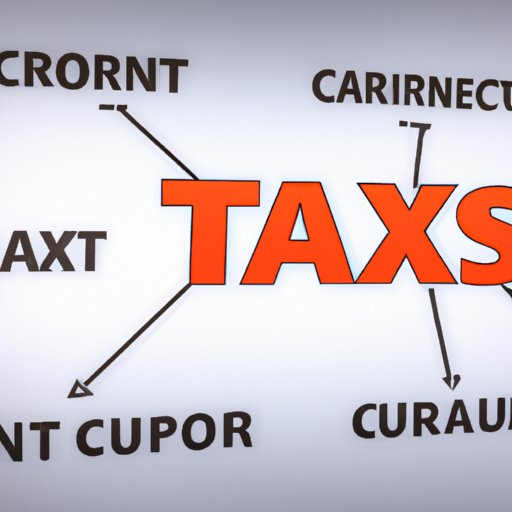Introduction
Cryptocurrency has grown increasingly popular over the past few years as an alternative form of investment. With the rise of digital currencies like Bitcoin, Ethereum, and Litecoin, more and more people are looking to capitalize on their potential profits. But what many investors don’t know is that they may be subject to capital gains taxes when trading cryptocurrency.
In this article, we’ll explore the basics of capital gains tax and how it applies to cryptocurrency investments. We’ll also provide a guide to understanding the tax implications of investing in crypto and offer strategies for minimizing your tax obligations.

Explaining the Basics of Capital Gains Tax on Cryptocurrency
Before jumping into the specifics of capital gains tax on cryptocurrency, let’s first define what capital gains tax is. Capital gains tax is a type of tax imposed on the profits made from the sale of an asset, such as stocks, bonds, real estate, or cryptocurrency. The amount of tax you owe depends on a variety of factors, including the length of time you held the asset, the cost basis (or purchase price) of the asset, and the sales price of the asset.
Now that we’ve got the definition out of the way, let’s take a look at the Internal Revenue Service’s (IRS) stance on cryptocurrency and capital gains tax. In 2014, the IRS issued guidance stating that virtual currency should be treated as property for tax purposes. This means that any profits made from buying and selling cryptocurrency are subject to capital gains tax.
It’s important to note that capital gains tax does not apply only to profits made from trading cryptocurrency. It also applies to any income generated from using cryptocurrency, such as mining rewards, transaction fees, and interest earned from lending cryptocurrency.
So now that you know the IRS’ stance on cryptocurrency and capital gains tax, let’s take a look at how to calculate capital gains tax on crypto profits. Calculating your capital gains tax liability requires you to know the cost basis of your cryptocurrency holdings. The cost basis is the original purchase price of the cryptocurrency plus any associated fees, such as transaction fees.
Once you have your cost basis, you can calculate your capital gains tax liability by subtracting the cost basis from the sales price of the cryptocurrency. If the result is a positive number, then you must pay capital gains tax on the amount. If the result is a negative number, then you can deduct the amount from your taxable income.

A Guide to Understanding Cryptocurrency and Capital Gains Tax
Now that you understand the basics of capital gains tax on cryptocurrency, let’s take a look at some of the benefits of paying capital gains tax on crypto profits. For starters, paying your capital gains taxes ensures that you remain compliant with the law and avoid any penalties or fines. Additionally, you may be able to deduct any losses incurred from cryptocurrency trading to reduce your overall tax liability.
It’s also important to be aware of common mistakes to avoid when paying capital gains tax on crypto. One of the most common mistakes is failing to report all of your cryptocurrency transactions. The IRS requires you to report all of your crypto-related income and expenses, so make sure you accurately track and report all of your trades. Additionally, make sure you keep detailed records of all of your cryptocurrency transactions so you can easily calculate your capital gains tax liability.
Top Strategies for Minimizing Capital Gains Tax on Cryptocurrency Profits
Finally, let’s take a look at some strategies for minimizing your capital gains tax on cryptocurrency profits. When it comes to minimizing your tax obligations, it’s important to understand the differences between short-term and long-term capital gains. Short-term capital gains are profits made from selling an asset after holding it for less than one year, while long-term capital gains are profits made from selling an asset after holding it for more than one year.
For short-term capital gains, one of the best strategies is to take advantage of tax-loss harvesting. This strategy involves selling off any losing investments to offset any gains made from other investments. For example, if you made $1,000 in profits from trading cryptocurrency, but had $500 in losses from another investment, you would only be taxed on the $500 in profits.
For long-term capital gains, one of the best strategies is to use a retirement account. Retirement accounts, such as a Traditional IRA or Roth IRA, allow you to defer or even eliminate your capital gains tax on cryptocurrency profits. Additionally, these accounts provide other tax benefits, such as tax-deductible contributions and tax-free withdrawals.
Conclusion
In conclusion, capital gains tax on cryptocurrency is an important consideration for any investor. Although there are a few benefits to paying capital gains tax on crypto profits, there are also strategies available to help minimize your tax obligations. By understanding the basics of capital gains tax and taking advantage of tax-saving strategies, you can ensure that you remain compliant with the law and maximize your profits.
To recap, capital gains tax applies to any profits made from trading, using, or accepting cryptocurrency. The IRS treats cryptocurrency as property for tax purposes, so it’s important to accurately track and report all of your crypto-related income and expenses. Additionally, there are a few strategies available to help minimize your capital gains tax on cryptocurrency profits, such as taking advantage of tax-loss harvesting and using retirement accounts.
(Note: Is this article not meeting your expectations? Do you have knowledge or insights to share? Unlock new opportunities and expand your reach by joining our authors team. Click Registration to join us and share your expertise with our readers.)
